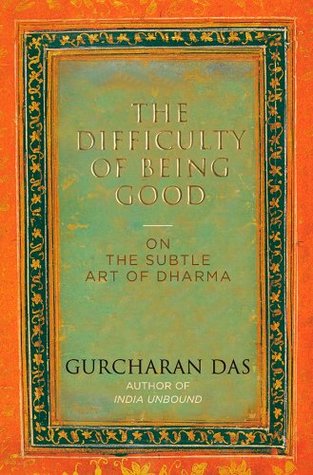More on this book
Community
Kindle Notes & Highlights
Read between
April 4 - July 15, 2018
It does not gloss over his contradictions, nor does it try to idealize him—his flaws are there for all to see.
If good persons are not allowed to win by any means, and if they must fight justly, then one must be prepared to face the fact that they might lose.
There is no guarantee that truth and goodness will prevail in human history.
It was, in part, on this very human need for faith in God’s grace that Ramanuja built his bhakti philosophy in the eleventh century in south India.
An influential defence of God in the West argues that human free will is something of value. God cannot eliminate evil and suffering in the world without also eliminating the free will of human beings to do evil and good things.
But why would God risk populating the world with free creatures if he knew that they would mess it up with wrongdoing?
the point of the Mahabharata is that dharma is sukshma, ‘subtle’, and it is often difficult to tell right from wrong.
Since Krishna’s deceptions take place on the human stage, they are an expression of our ambiguous human condition. To have done otherwise would have been to miss the point.
The nighttime massacre of the sleeping armies was a deed of such repulsive proportions that it turned the mood of the epic from heroic triumph to one of dark, stoic resignation.15
Consciously one denies it, of course, and proclaims piously, ‘I’m not the sort of person who holds grudges.’ Yet one unconsciously applauds when the villain ‘gets what he deserves’.
human beings want to get even.
According to the political philosopher Jean Hampton, the aim of punishment is not to avenge wrongdoing or to inflict pain and injury on the offender but ‘to annul the offender’s claim of superiority’.
‘On no account brood over your wrongdoing. Rolling in the muck is not the best way of getting clean.’
Bernard Williams, the English philosopher, objects to remorse because it turns the focus on oneself rather than on the one who is injured.
A person who is distrustful of worldly achievement is less likely to step on the toes of others. Such a person is on the way to acquire the virtue of ahimsa.
Non-violence does not come from weakness but from strength, and only the strong and disciplined can hope to practise it.
What we need is more remorse, not less, but it is somehow considered unmanly in most modern societies.
Today, when ordinary people use the word ‘altruism’, they invariably think of noble acts of self-sacrifice. This places altruism on a pedestal and beyond the reach of the common person.
The quest for ‘dharma’ is more important than the quest for ‘God’ in the epic, something quite remarkable in a semi-religious text.


